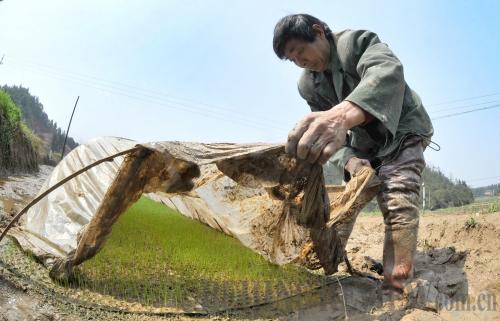|
 |
|
HARD AT WORK: A farmer in Wangcheng County, Hunan Province, covers paddy seedlings (LONG HONGTAO) |
In 1955-68, many people in Japan's Toyama Prefecture suffered from excessive quantities of cadmium found in rice and water sources. A total of 207 people died as a result. After strict measures to tackle pollution, rice produced in Toyama has been tested cadmium-free.
The Toyama lesson serves as a good warning to regions in China with excessive soil pollution, say experts. "In order to develop local economies, many grain producing areas are introducing industries likely to bring heavy metal pollution. Without controlling measures by the government, there could be immeasurable disaster," said Xu.
He suggests the government formulate regulations to prohibit industries and enterprises likely to bring heavy metal pollution from entering major grain production areas, and those already set up should be moved out as soon as possible.
The country should no longer evaluate the performance of local officials based on industrial development but on grain production and food safety, Xu adds.
The Chinese Government is aware of the need to control soil pollution. In March 2012, the Ministry of Agriculture (MOA) and the Ministry of Finance (MOF) jointly released a plan for preventing and controlling heavy metal pollution in agricultural regions. The MOF also allocated 827 million yuan ($131.9 million) to the MOA to conduct a survey in the next five years on soil pollution. The MOA has gathered a group of experts to offer technological assistance in controlling soil pollution.
The tainted rice scandal has forced local governments to accelerate the implementation of the MOA and MOF scheme. Some pilot projects have started in Hunan to recover heavily polluted land.
Rice market affected
Although Hunan is currently investigating its own problems with tainted rice, results have yet to be publicized, forcing local farmers and grain companies to consider halting rice production altogether.
The scandal has even affected some listed companies too. Hunan Jinjian Cereals Industry Co. Ltd., listed on the A-share market, saw its stock price drop since March. Although rice prices are stable, there seems to be no motivation for stock prices to rise.
Guangzhou Zhujiang Brewery Co. Ltd., also listed on the A-share market, suffered the same price decline as Jinjian for purchasing a large amount of rice from Hunan.
Every year Hunan produces 13 percent of China's rice output. After ensuring supplies for the locals, the province sells its rice to south China markets including Guangdong Province, Guangxi Zhuang Autonomous Region and Fujian Province. As more tainted rice was found, sales to the south have slowed, causing many rice processing factories in Hunan to shut down.
The prefecture-level city of Yiyang in Hunan is the province's biggest rice producer with more than 200 rice processing factories and an annual output of 2 million tons. Of the total, 70-80 percent is sold to Guangdong and Fujian. Yiyang was once full of trucks transporting rice to the south, but journalists visiting the region in mid March have seen fewer trucks and more closed factories.
As one of China's biggest rice producers, if Hunan produces less rice, tremors will be felt throughout the entire rice market. Southern regions would have to purchase rice from the country's northeast or import rice from countries like Thailand at higher prices so as to satisfy market demand.
Email us at: lanxinzhen@bjreview.com | 